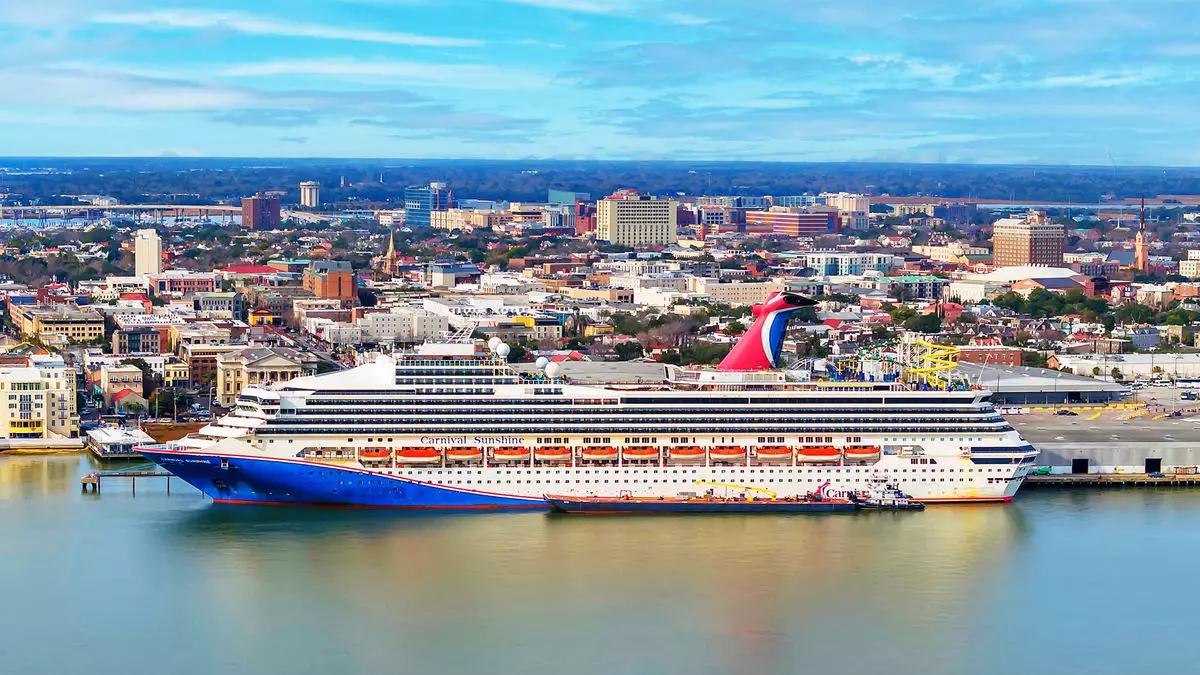Carnival Corporation, the titan of the cruise industry, has recently emerged as a focal point in financial discussions, particularly after announcing its quarterly earnings amidst a politically charged environment. CEO Josh Weinstein faced a barrage of questions regarding the company’s prospects following President Trump’s tariffs and the ensuing trade war that rattled global markets. While uncertainty loomed, Weinstein projected a stabilizing outlook for Carnival, proclaiming the company is not only weathering the storm but, in fact, thriving in the current conditions.
The company highlighted a remarkable 10% uptick in onboard spending year-over-year during the first quarter, a statistic that isn’t merely a number, but a testament to the consumers’ enduring appetite for cruise vacations despite external pressures. In a bold assertion, Weinstein described the recent Wave season as resoundingly successful, marked by an unprecedented surge in bookings and robust revenues. The fervor for cruising remains palpable; Carnival is successfully attracting a wave of new customers, signaling that the allure of the open seas persists undeterred by geopolitical concerns.
Strategic Strength: Carnival’s Pricing Advantage
A critical element that sets Carnival apart during turbulent times is its competitive pricing structure. Weinstein’s candid remarks about the favorable price gap between cruise and land vacations underscore a strategic advantage that insulated Carnival from the harshest effects of market volatility. He noted, “Even though it pisses me off when we look at the price gap… that is a huge strength that we have,” effectively highlighting how Carnival’s value proposition resonates with budget-conscious travelers seeking enriching experiences without breaking the bank.
This price competitiveness represents not just a selling point but also a pillar of resilience, allowing Carnival to maintain strong booking momentum. While rising inflation and wavering consumer confidence pose challenges, Carnival’s ability to provide superior experiences at attractive prices is a powerful draw for families and individuals exploring vacation options.
The Broader Landscape: Insights from the Travel Advisors
While Carnival shines, there’s a more nuanced narrative emerging from travel advisors who interact directly with customers. According to Cleveland Research Co., perceptions within the industry are mixed. Approximately 27% of advisors indicated that their bookings outperformed expectations in recent weeks, down significantly from 53% two months prior. This shift reveals the shifting sands of consumer sentiment and highlights how external economic indicators can impact individual decisions, even in a market buoyed by a leading brand like Carnival.
Travel advisors have observed a mix of sentiments from clients. Many remain hesitant due to uncertainties surrounding trade policies, fluctuating stock markets, and broader economic conditions. Geoff Cox from KHM Travel Group articulated a cautious outlook, attributing the deceleration in bookings to various factors ranging from economic woes to individual apprehensions about international travel.
Luxury Market Resilience Amidst Uncertainty
Interestingly, while general bookings face pressure, the luxury cruise segment appears robust, with significant increases reported—some brands reporting as high as a 15% increase. This divergence prompts consideration of market segmentation; affluent travelers may feel insulated from economic downturns, continuing their trend of lavish vacations. The luxury market not only reflects spending capability but also a desire for exclusive experiences that are less sensitive to geopolitical turbulence.
Amidst these insights, concerns loom regarding the long-term implications of federal policy changes on the cruise market. Jean Paul Carufo, who operates a travel agency in Oregon, expressed unease about the lasting effects of governmental shifts on both her business and the industry at large. These concerns, coupled with apprehensions about how Americans are perceived abroad, intricately weave a complex tapestry of emotions shaping consumer behavior.
A Surge of Optimism: New Perspectives in the Market
Conversely, the narrative isn’t devoid of optimism. Steve Skidgel from Cruisebound noted a remarkable turnaround in bookings after a series of fluctuations in January and February. March, he claimed, has been “spectacular,” replete with record-setting booking days that signal a potential rebound in consumer confidence. This suggests that the market possesses an inherent elasticity; after times of uncertainty, consumers frequently rediscover their zeal for travel.
Such divergences in market behavior reflect a broader theme throughout the cruise industry and serve as a reminder that while external conditions shape consumer sentiment, the intrinsic desire for exploration and adventure remains strong. Despite the unpredictable winds of the global economy, the resilience of both cruise lines and their guests continues to shine through. In an ever-evolving landscape, the ability to adapt, innovate, and cater to the changing needs of travelers will ultimately define success for industry players in navigating turbulent waters.


Leave a Reply